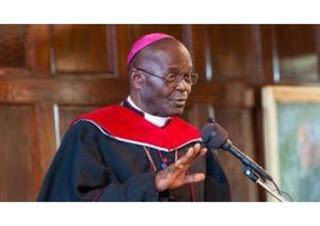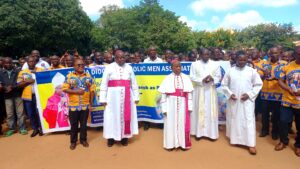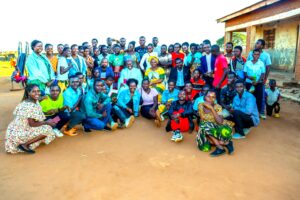ZAMBIA: ‘Let us accompany couples in marriages’ Says Archbishop Mpundu

Archbishop Telesphore Mpundu
Archbishop Telesphore-George Mpundu of the Archdiocese of Lusaka, who is also President of the Zambia Conference of Catholic Bishops ((ZCCB) has suggested three stages of formation aimed at strengthening marriages and family life in Zambia.
Speaking to Vatican Radio’s English Africa Service, Archbishop Mpundu spoke of his unease and alarm at the number of divorces being granted by Zambia’s civil courts. He reiterated his message made to parish councillors of Mumbwa Catholic Parish on the importance of supporting couples as well as putting in place pastoral programmes that accompany couples and families. The Archbishop was on a pastoral visit to Mumbwa last Sunday. Mumbwa is a town in the Central Province of Zambia, lying 160 Km west of the capital, Lusaka.
As has become the tradition of Mumbwa Catholic Parish, on the occasion of the Archbishop’s visit to administer the Sacrament of Confirmation, parish councillors met Archbishop Mpundu in a Question and Answer session.
Taking a question on Catholics who seek divorce in civil courts after blessing their marriage in a Catholic Church, the Archbishop spoke of his disquiet with the trend.
“There is a high rate of divorce prevailing in Zambia today; Lusaka alone last year recorded over 8,000 marriages granted divorce by local, magistrate and even the high court. This is because the laws of Zambia permit divorce under certain conditions and circumstances. As for us, Catholics, the fault is almost entirely of our own making because when young people want to receive the Sacrament of Matrimony, they know they have to go to the Church so that the priests can do the needful and finally bless the marriage in Church.
When problems arise in marriage, they do not go back to the priests to seek guidance and counselling but run to the courts because they know that the Church does not permit divorce. However, as soon as the courts grant them divorce they remarry and return to the Church and want to be re-admitted to the Sacraments of Penance and the Eucharist! The divorced and remarried are not allowed to receive the Sacraments of Penance and Eucharist. The Church does not recognise divorces granted by civil courts of whatever level granted to Catholic couples because a validly contracted Catholic Church Marriage cannot be broken. In other words, it is indissoluble,” Archbishop Mpundu told his audience.
The Archbishop, however, urged parishes to ensure adequate preparation of young couples who wish to access the Sacrament of Matrimony. He suggested that there ought to be in place a programme of pre-marriage catechesis for young adults after they receive Confirmation; marriage catechesis for engaged couples with the intention of tying the knot of Matrimony and then later Family Life catechesis which he described as very critical.
“The stages mentioned (above) are critical because most young people enter marriage with very little if any useful knowledge of what it is all about. Traditional life provided the formation mainly for the young women but little if anything for the young men except perhaps in patrilineal societies. In all this there was and still is a lot that does not agree with the Catholic Christian doctrine and morals; it needs to be evangelised. Besides, Traditional life provided quite well the support mechanism for the newly married and young couples, but this support is largely absent in the rapidly urbanised Zambia. This vacuum must be filled-in efficiently and effectively by the Church otherwise the two institutions of marriage and family will be greatly weakened and finally damaged beyond repair in the foreseeable future. The future of the family is the future of the Church; The Catholic Family is known as “the Domestic Church”. To the measure that the family is adversely affected is to the same measure that the Church is affected,” Archbishop Mpundu emphasised.
By Fr Paul Samasumo –Vatican Radio


